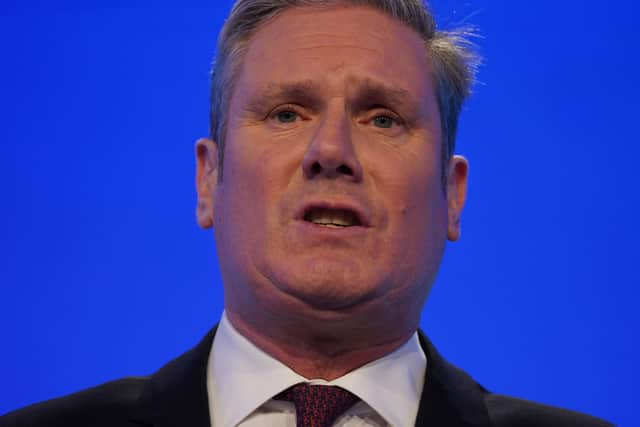We should start talking seriously about what immigration has to offer the country - Jayne Dowle
Or you find yourself wading through the conversational equivalent of mud; a kind of resigned acceptance that there are no easy answers. Politicians generally do exactly the same thing, only on a larger scale and with a public audience.
However, Labour leader Sir Keir Starmer has now thrown down the gauntlet, with a speech to business leaders at the Confederation of British Industry (CBI) annual conference this week.
Advertisement
Hide AdAdvertisement
Hide AdHe’s saying that under his leadership, the government would be “pragmatic” on skills and labour shortages and would not try to bury its head in the sand over the need for people to come into the country to fill the estimated 1.2 million-plus job vacancies we currently have.


To be honest, Starmer is still presenting us with something of a fudge.
He would probably describe it as ‘covering all bases’.
Whilst insisting he would be “pragmatic” on the skills and labour shortages being experienced in many key industries and services, and promising to improve on the existing points-based immigration system - brought in after Brexit – he’s also calling for businesses to focus on “investing more in training up workers who are already here”.
In his speech, he also warned that “the days when low pay and cheap labour are part of the British way of growth must end”. This was a particular welcome note.
Advertisement
Hide AdAdvertisement
Hide AdOne of the major reasons why all those logistics hubs and warehouses and care homes are going without staff is because people with established family histories of living in this country simply don’t want to work long hours for long wages, often on zero hours contracts, under poor conditions and with no job security.
And this means that crucial jobs are going unfilled – remember the panic over the shortage of HGV drivers last year? Haulage industry experts say there is still a shortfall of around 70,000 drivers in the UK. Since Brexit, companies can no longer rely on overseas drivers to come here to work.
What politicians are failing to do is to acknowledge this kind of situation on one hand, and forge a pragmatic approach to those who would like to come to this country to live on the other.
Far too often, crucial differences between economic migrants, refugees and asylum seekers are massively overlooked, sowing panic and confusion. Derogatory terms such as describing immigrants as an “invasion” in order to drive a political agenda are both unhelpful and dangerous, and do nothing to educate the public about the subtleties of global politics.
Advertisement
Hide AdAdvertisement
Hide AdOver the years, especially when I worked part-time in education, I’ve come across heart-breaking stories, often from young people fleeing very real persecution in hell-holes in Africa and the Middle East, who just wanted to study and to work, and found themselves tied up in red tape instead.
These human stories, especially under the reign of the ‘hostile environment’ which saw more than 80 Windrush citizens illegally deported and countless others given no option but to leave the UK, are tragic, and all too often trodden on in official circles.
No assumptions should be made either. Views on immigration do not follow any kind of traditional political allegiance; it’s not a Right-Left thing, but a conviction that has as much to do with education, social class and life experience as political sway. The EU referendum in 2016 proved that. In Barnsley, where I live, a Labour-held post-industrial stronghold since time immemorial, more than twice the number of people who voted Remain (38,951) voted to Leave (83,958).
The Leave voters were motivated not by their MPs - Dan Jarvis, who represents Barnsley Central for Labour, has voted for and against leaving the EU on a series of occasions in the House of Commons, but overwhelmingly in favour of staying - but by their own fears over immigration.
Advertisement
Hide AdAdvertisement
Hide AdAs we know, the EU wasn’t immigration, and immigration isn’t the EU, but duplicitous ‘Vote Leave’ campaigners so easily made it seem that way. However, six years after the most divisive referendum in UK history, we should now seriously pivot away from the referendum and focus all our attention on what the movement of people between countries should actually mean to us, as a modern, multi-cultural society with jobs to offer.